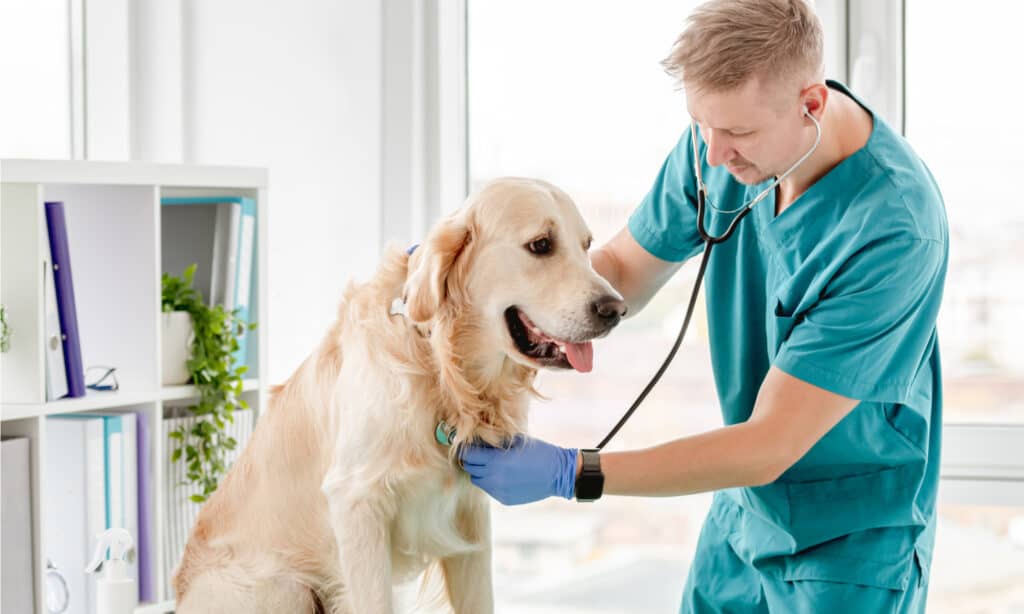Just like humans, dogs get sick. It’s no fun to see your furry friend feeling under the weather. What makes it a bit harder is that pets can’t tell us what is bothering them. Dog owners know how heartbreaking it can be to wonder how their pup is truly feeling. However, by being an attentive pet owner, you can help your best friend feel better.
Vomiting one time is fairly normal for dogs. They may have eaten something bad or caught a stomach bug. We have all seen dogs who eat too fast or too much throw up shortly after a meal. However, if your dog throws up multiple times or has other symptoms, it’s time for a call to the vet.
It’s important to note the difference between vomiting and regurgitation. Dogs may regurgitate things that get stuck in their throat or that are difficult to swallow. Signs of regurgitation are different than those of vomiting.
| Regurgitation symptoms | Vomiting Symptoms |
|---|---|
| Coughing | Excessive drooling |
| Difficulty breathing | Retching |
| Undigested food comes up | Abdominal contractions |
| The throw up may resemble a cylinder shape | Throw up is mainly partially digested foods |
When to Contact Your Vet
If your dog throws up more than once in a single day, you should give your vet a call to see if they have any advice on what to watch for. You should also call your vet if you suspect your dog has eaten something he wasn’t supposed to eat.
You should definitely take your dog to the vet if he has any of the following symptoms along with vomiting:
- Fever
- Lethargy
- Sudden weight loss
- Blood in the vomit
- Diarrhea
- Bloody diarrhea
- Seizures

Contact your vet if your dog throws up and has other symptoms like fever, seizures, and diarrhea.
©Tatyana Vyc/Shutterstock.com
Why Do Dogs Throw up – Causes of Vomiting in Dogs
There are numerous conditions and factors that can make your dog throw up. You should work with your veterinarian to narrow down which one is affecting your dog so you can find the appropriate treatment.
Eating Something They’re Not Supposed to Eat
There are lots of things dogs are not supposed to eat: chocolate, grapes, avocados, and xylitol are just a few items that can harm your dog if ingested. Your dog may throw up soon after ingesting something toxic. However, she may also experience more adverse symptoms several days later.
If your dog eats something toxic, or if you’re not sure if she has, contact your vet. You may not have to bring your dog in, but your vet can give you valuable information over the phone, such as what to do if their symptoms worsen.
Parasites
Intestinal parasites can be particularly harmful in puppies because they prevent them from getting essential nutrients. This can lead to poor growth during an essential stage of life. Luckily, in adult dogs, parasites are usually a mere nuisance, with the exception of heartworm, which causes a life-threatening infection. With other types of worms, dogs may experience upset stomach, anemia, or other symptoms.
Intestinal parasites that dogs can get include:
- Roundworm
- Tapeworm
- Heartworm
- Hookworm
- Whipworm
If your dog has worms and throws up, you may see the worms in the vomit, especially with roundworms. You may also be able to see the worms in your dog’s poop, or around their rectum. Dogs with worms often seem to have an itchy rear end and may have a bloated stomach.
Treatment for worms is both simple and effective. “Deworming” consists of an antiparasitic medication that your vet will prescribe. Because puppies are so prone to worms, vets recommend giving your puppy a preventative dose of antiparasitic around three weeks old. Many pet owners give their dogs a monthly medication to prevent heartworm specifically.
You can prevent worms by keeping your dog flea-free since some worms come from fleas. You should also always wash your hands after handling dog waste and get your dog checked for worms at their annual check-up.

Grooming a dog regularly will get rid of all unwanted parasites that can cause vomiting.
©Masarik/Shutterstock.com
Infection
Some bacterial and viral infections can cause dogs to throw up. The intestines become inflamed, causing symptoms. Similar to humans, this condition is called gastroenteritis. To diagnose a bacterial or viral infection, your vet will perform a complete blood cell count panel (CBC). This will let them know if there is an infection.
Then, they may do further testing to pinpoint the type of infection to see if antibiotics would help. They may also prescribe anti-diarrheal or anti-emetic (vomiting) medications to help until the infection passes.
Blockage
Dogs love to eat and chew on things they are not supposed to. Things like rubber toys, bones, children’s toys, and even socks have been found in dogs’ intestines. When there is a blockage, a dog may throw up, have diarrhea, or experience dehydration.
Your vet can diagnose an obstruction via imaging, like an X-Ray or ultrasound. Once they have pinpointed the object, they may observe the dog for a specified period of time to see if it will pass naturally. If it does not come out in the stool, there are two options:
- Endoscopy – in this procedure, your vet will use a small tube with a camera and claw on the end to grab the item out of your dog’s stomach and pull it out through the mouth. This only works with small items.
- Surgery – your vet will open your dog’s intestines to remove the foreign object and restore the intestines to normal functioning.
The best way to prevent an intestinal blockage is to train your dog well and teach him the command “leave it,” so he is less likely to eat random objects.
Heatstroke
All dogs can get overheated, but northern breed dogs and those with thick fur may be especially prone to heatstroke. Symptoms of heatstroke in dogs include:
- Excessive panting
- Drooling
- Red gums
- Fainting
- Vomiting
- Diarrhea
If you think your dog has heatstroke, get her to a cooler environment immediately. Give her plenty of cold water to drink. Wet a towel with cold water and put it on your dog’s back. Call your vet and find out if you need to bring her in for IV rehydration and other treatment.
To prevent heatstroke, pay special attention to your dog in hot environments. Make sure he always has access to water and shade. If your dog is energetic, monitor his exercise on hot days to prevent overheating. Never leave your dog in the car during the day. The sun can easily heat the car to deadly temperatures in a very short amount of time.
Medication or Food Reaction/Allergy
Dogs may vomit as a side effect of a medication or a food allergy. Symptoms of a food allergy include frequent scratching (itchy skin), vomiting, and diarrhea. Symptoms of a medication reaction include itchy skin, redness, hives, hair loss, vomiting, diarrhea, seizures, difficulty breathing, and even fainting.
Whenever your dog starts a new medication, be aware of any potential side effects and report to your vet if any occur.
If you suspect a food allergy, your vet may recommend an elimination diet to find out exactly what your dog is reacting to. There are also blood tests that may help to identify the allergen.
The only way to treat a medication reaction or food allergy is to change the medication or avoid the allergen.
Pancreatitis
This condition is an inflammation of the pancreas. It occurs when the pancreas malfunctions. Normally, this organ releases digestive enzymes that help break down food in the intestines. When it doesn’t work properly, it releases the enzymes too soon, damaging the pancreas and surrounding tissue by essentially starting to digest it.
Symptoms of pancreatitis include:
- Hunching over
- Vomiting
- Bloated abdomen
- Diarrhea
- Not eating
- Weakness
- Lethargy
- Fever
- Dehydration
Some dog breeds are genetically prone to pancreatitis. However, it can also be caused by:
- A high-fat diet
- Eating too much human food or garbage
- Being overweight
- Diabetes
- Endocrine diseases
- Some medications
- Some toxins
- Blunt trauma to the area
To diagnose pancreatitis, your vet team will do testing to measure the levels of digestive enzymes in the blood. They will also X-Ray the abdomen to rule out other conditions. Finally, they will take a biopsy of the pancreas to confirm the condition.
The first line of treatment for pancreatitis is to give your dog’s system a rest. Your pup may need IV fluids to rehydrate. Your vet will recommend an anti-vomiting medication and to avoid giving your dog food or water for a full 24 hours.
Once your dog is stable, the treatment involves diet management. You should not give your dog any human food, no matter how much she begs. Look into prescription low-fat dog foods to help your dog’s pancreas. You should also feed your dog smaller meals throughout the day versus one or two larger ones. Finally, keep everything in check by having your dog’s pancreatic enzyme and lipid levels checked often.

Being overweight can cause a lot of problems in dogs, like pancreatitis.
©Nick Chase 68/Shutterstock.com
Kidney Disease
Chronic kidney disease, or chronic renal failure, means that your dog’s kidneys are not working as well as they should to filter waste out of the bloodstream. Unfortunately, by the time symptoms of kidney disease are noticed, your dog’s kidneys are likely 66% less effective than they should be. The damage can take place over months or years before you notice any symptoms.
This condition usually happens in older dogs. In large dogs, it can happen as young as seven years old. In smaller dogs, you may see kidney disease between 10 and 14 years old.
Symptoms of kidney disease in dogs include:
- Not eating
- Vomiting
- Diarrhea
- Lethargy
- Bad breath
To diagnose kidney disease, your vet will do a urinalysis to see if there are any indicators. If there are, they will also do a blood test to measure waste in the blood.
Once your dog is diagnosed, there are two stages of treatment. First, your vet will flush the toxins out of your dog’s blood with large amounts of IV fluids. For some dogs, this treatment helps to bring some functionality back to the kidneys. For others, it does not.
In the second stage of treatment, you’ll feed your dog special food for kidney disease. These foods are low in protein and phosphates and are not acidic. Your vet may also give your dog other prescription medications to manage the symptoms of kidney failure, depending on the specific situation. With care, many dogs can live a great life with kidney disease.
When in Doubt, Call the Vet!
A call to your vet is never a bad idea. It can only help! If your dog is throwing up, give the vet a ring for information on what to do and make an appointment if necessary. Your furry BFF will appreciate the care!
The photo featured at the top of this post is © Javier Brosch/Shutterstock.com
Ready to discover the top 10 cutest dog breeds in the entire world?
How about the fastest dogs, the largest dogs and those that are -- quite frankly -- just the kindest dogs on the planet? Each day, AZ Animals sends out lists just like this to our thousands of email subscribers. And the best part? It's FREE. Join today by entering your email below.
FAQs (Frequently Asked Questions)
When should I take my dog to the vet for vomiting?
If your dog vomits more than once in a single day, you should at least give your vet a call to see if they have any advice on what to watch for. You should also call your vet if you suspect your dog has eaten something they weren’t supposed to.
What causes vomiting in dogs?
There are numerous conditions and factors that can make your dog throw up. You should work with your veterinarian to narrow down which one is affecting your dog so you can find the appropriate treatment.
Thank you for reading! Have some feedback for us? Contact the AZ Animals editorial team.






